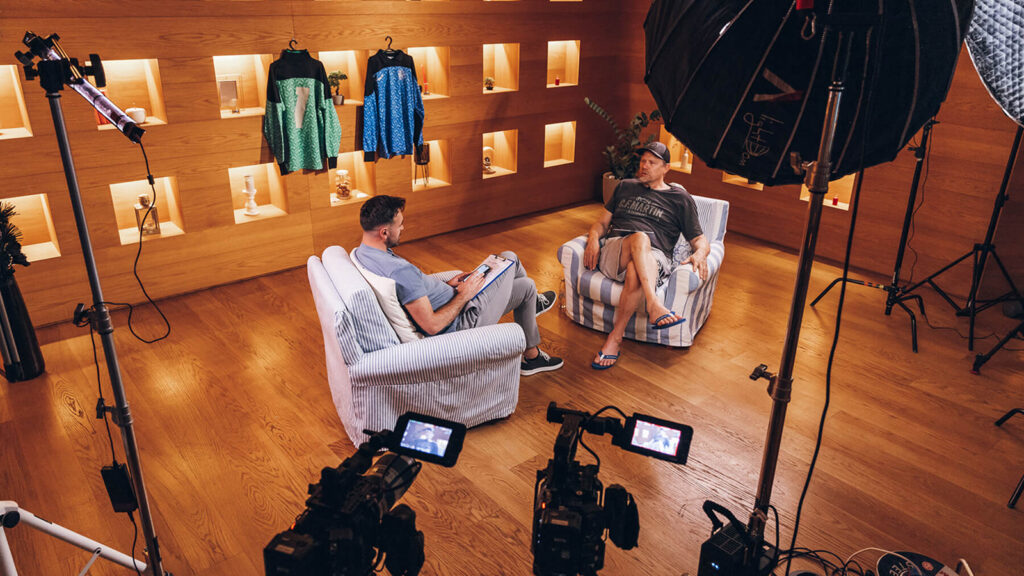Sofascore: Hello guys. We’re back in Croatia, precisely in Zadar, at the well-respected Sunset Sports Festival – and we had the pleasure and the honor of talking with one of the most iconic goalkeepers of all time. Just in 1999, he won the Premier League, the FA Cup, and the Champions League. And those were just three out of 24 major trophies, including a European Championship with Denmark. Oh, and did we mention he had a nice habit of scoring goals too? He was the first goalkeeper to ever score in Premier League history. Yep – the legendary Peter Schmeichel is with us.
Sofascore: Mr. Schmeichel, it’s a big pleasure to have you here and to welcome you to our YouTube series called A Guest and a Half – 45 minutes of small talk, big names, and stoppage time.
Peter Schmeichel: So who’s the half?
Sofascore: Oh, you are. You’re the guest and a half.
Schmeichel: Thank you very much.
From the pitch to the studio – Schmeichel on life with CBS Golazo
Sofascore: As a proper legend, widely recognized as one of the best in football history, we obviously have a lot of big achievements to go through from your international and club career. But since you’re now doing an amazing job as part of the CBS Golazo crew, let me start there. It seems like you’re really enjoying it.
Schmeichel: Yeah, I do. Since I retired, the only thing I’ve done is work in the media. I’ve done many different jobs, and then CBS got the rights for the Champions League. Pete Radovich needed to put together a team. He came to me and asked if I wanted to be part of it – I said yes straight away.
And I actually think the whole show is a game changer in how football broadcasting is done. It’s much more fun, more entertaining, but still very serious and analytical. It’s great to be part of a team where there isn’t a long distance between idea and screen. You bring something up, and they say, “Let’s do it.” That’s down to the people producing the show – and of course, the team on screen is just fantastic.
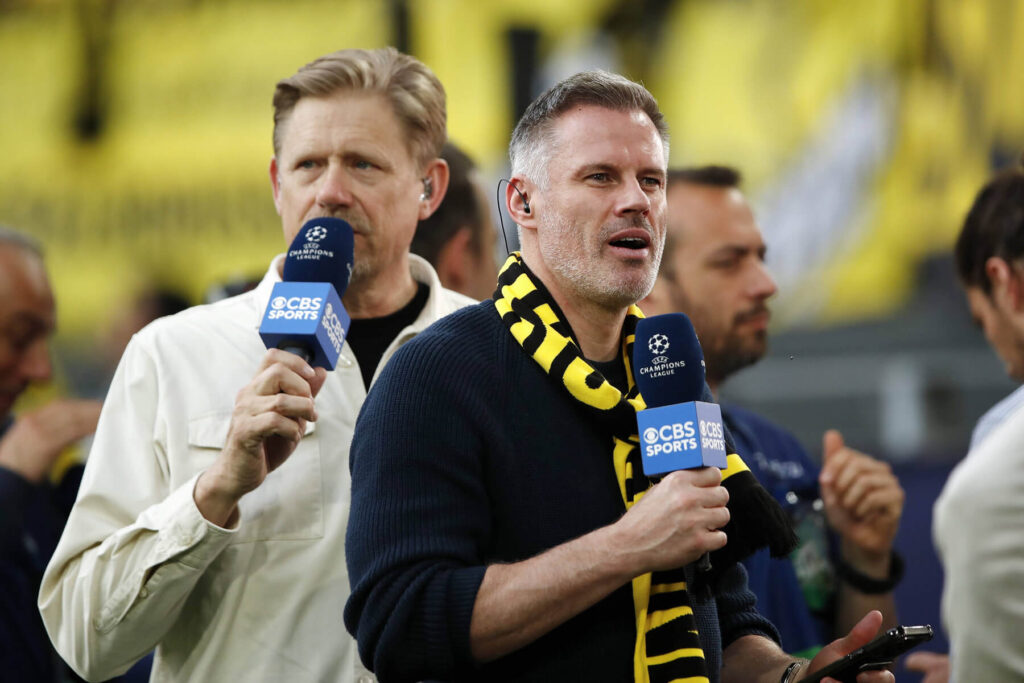
Being at the games has been a big change for me, and I really enjoy it. It’s different when you’re physically there. You see what the cameras don’t show. And it’s more loose. You can leave the desk, walk around with a cordless mic, and talk to people even while on air – that was unheard of just a few years ago.
What that does is draw the viewer into a more live, authentic experience. That’s a credit to CBS and Pete Radovich. I love it.
Hosting Sofascore’s Player of the Season at Sunset Sports Festival
Sofascore: Speaking of that, you’re also here in Croatia to share your experience at Sunset Sports Festival – alongside Kate Scott – as hosts of the Sofascore Player of the Season gala. How would you position Sofascore in the football world today? Because we know many of the players have our app and follow the data.
Schmeichel: It’s interesting because when I played, we didn’t have much information. A platform like Sofascore didn’t exist. Even the coaches didn’t have the kind of data they have today.

In some stadiums – just a few – there were cameras that could measure things like how many meters a player ran during a game. But that was about it. It wasn’t accurate enough to tell you things like how many times a player was offside. It gave coaches a vague idea about player performance, but nothing really precise.
Now? It’s completely different. Players wear GPS vests in every training session. I know all about this through my son. Every day, he receives an email with his performance data. And everything is filmed – they can even go back and watch the entire training session. Isn’t that amazing?
So it ties in with how platforms like Sofascore present data – and how players are now growing up with it. That’s why today’s players embrace it so naturally. But I’m not sure I would’ve been happy with that kind of information overload as a player.
That’s what I wanted to ask – isn’t it a bit too much sometimes? What does Kasper say?
Schmeichel: For Kasper, no – it’s not too much. He’s used to it. That’s how he’s been trained, how he’s been brought up in football.
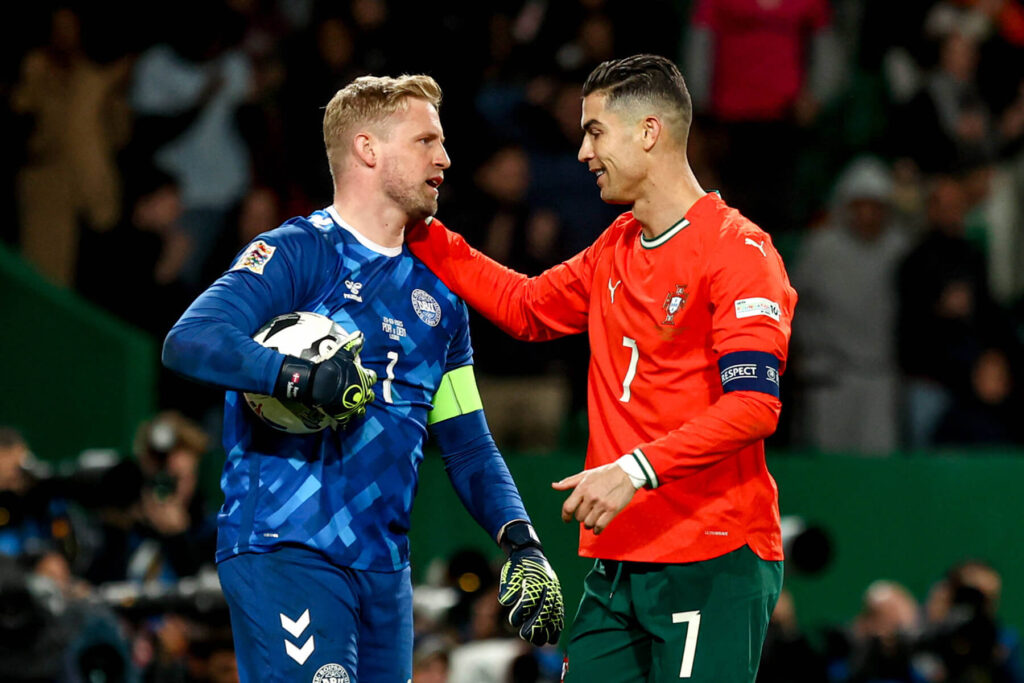
But for me? I absolutely hated it when a coach would come up to me before a match and say, “This striker always does this in this situation.” I didn’t want to hear it. Because from my point of view – if I flip it – I wouldn’t want the striker knowing what I would do either. I’d rather he think he knows me… but he actually doesn’t.
If you tell him, “If you’re in this situation, Schmeichel will do that,” well… even I don’t know what I’ll do until that moment comes. I read the situation, I trust my instinct, and I react accordingly.
For example, if we went into a penalty shootout, I’d make all of my decisions immediately after the final whistle. From the moment I walked from my goal to the center of the pitch, I would mentally lock in exactly how I’d handle all five kicks. And when the opposing player walked up, I wouldn’t even look at him. I wouldn’t assign him a name. I wouldn’t humanize him. I would just stick with the plan I made 10 minutes earlier.
Sofascore: But you also scored some goals yourself – including from the penalty spot!
Schmeichel: Yeah, I used to just hit it as hard as I could down the middle. It worked… until it didn’t. There was a season at Brøndby where we nearly had a penalty in every game – and we missed one in every game! Eventually, they said, “It’s your turn.” I hadn’t taken one in a while and missed the target completely.
We even had a European game against a Romanian team called Sportul Studențesc. Beat them 3:0 in Copenhagen. Should’ve been six or seven. Then we went to Bucharest, lost 3:0, went to extra time and penalties – and missed our first three. I was one of them. That’s how bad we were at penalties.
Luis Enrique’s PSG and the new blueprint for modern football
Sofascore: Let’s talk about the Champions League and Europa League final, you were at both as part of your current job.
Schmeichel: Are we going to talk about the Europa League final? I’m walking out now (kidding)
Sofascore: I know, it was tough for you. That’s why I want to start with the Champions League, particularly that incredible PSG drive. Did anyone see that coming?
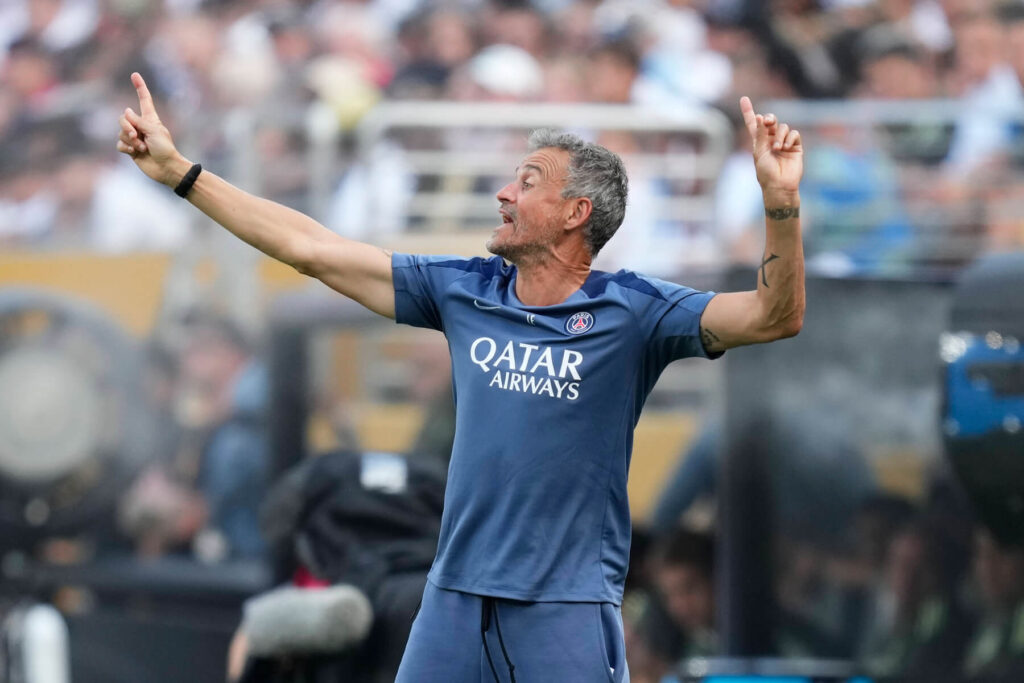
Schmeichel: No. The year before Mbappé left PSG, most people thought that would be the end of their European ambitions. But they don’t know anything about Luis Enrique. He’s not like that.
He knew exactly what he wanted to do. I think he even had to persuade the owners to let him do it his way. What he’s done is fantastic. He got PSG playing like a team while still allowing for individual brilliance.
Finding the balance between team structure and individual expression is tough – especially with younger players who lack experience. Dembele is the perfect example. He didn’t score in the five-goal final, but he stopped Inter from playing. Every time Yann Sommer had the ball, Dembele sprinted up. The camera didn’t show that – but being at the stadium, you could see how well they worked together.
That’s all Luis Enrique. I played against him many times – he’s relentless. I know he was a top candidate for Man United at one point, but he wanted to stay with Spain until after the World Cup in Qatar, so we missed that chance. What he’s done at PSG has changed football. That’s how football will be played from now on.
Sofascore: Do you think modern football needed that – a great coach, young devoted team, just a few stars instead of a team full of superstars?
Schmeichel: Absolutely. The whole Galáctico idea doesn’t work in today’s game. You can’t have three players doing nothing while the other eight work. I’ve seen PSG live many times – it wasn’t good enough before.
Football used to be obsessed with possession. But that’s changed. PSG can still build from the back, but they’re also direct. Look at Vitinha’s role in their second goal – the ball goes from Hakimi on the right, to Vitinha, and within 7-8 seconds it’s in the net. That kind of directness is devastating.
And I think that’s one of the biggest shifts we’re seeing now. There’s no longer this obsession with keeping the ball at all costs, just passing it around endlessly. Some coaches still want that, but… I love it. The variety makes it so much more interesting to watch – especially as a neutral.
Sofascore: You interviewed Vitinha after the final. Were you impressed by how deeply he analyzed the match?
Schmeichel: Not really surprised – that’s modern footballers. Their preparation is so detailed. They know exactly what happened on the pitch.
But Vitinha himself? I’m really impressed. He’s the key to everything good in that team. He drives the game, he’s always available, he presses, he recovers. There was a moment in the final when he lost the ball – and won it back within two seconds.
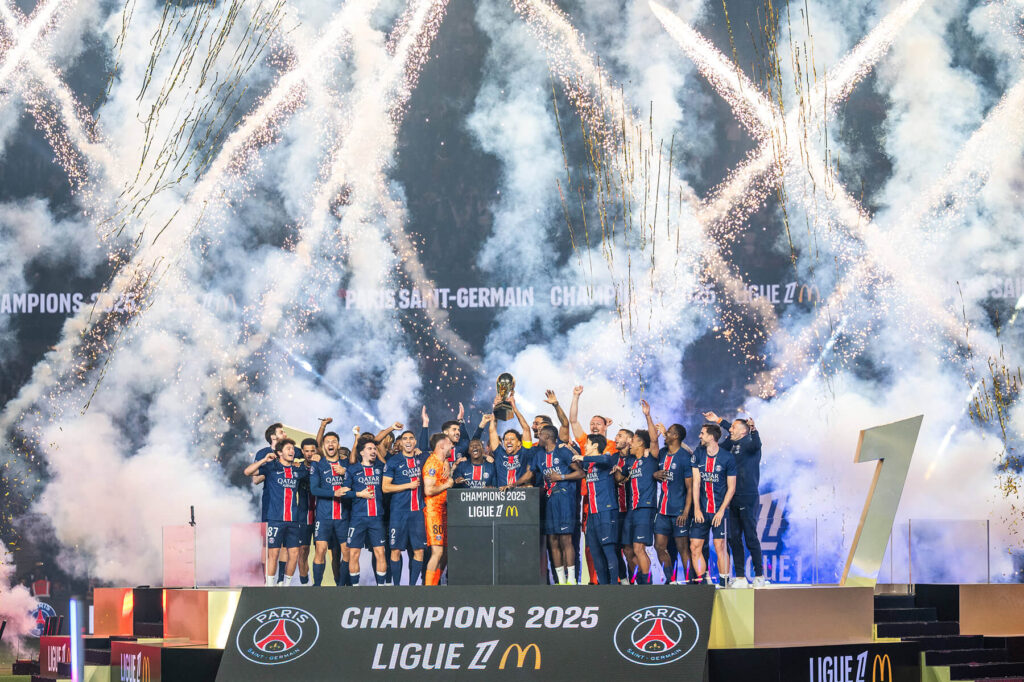
Players like João Neves and even Fabián Ruiz benefit from what Vitinha does. People compare him to Rodri, but he’s a different player. I don’t want to say anything bad about Modrić, he’s one of the best I’ve ever seen in my life.
But Vitinha is something different. He’s not like Rodri or Modrić, he’s the combination of all of those things. And he’s the most important player in that team.
I just hope he gets the Ballon d’Or consideration. He deserves it, he’s been that good. You take him out of that team, and that is another team.
Sofascore: Speaking of PSG players, let’s talk about Désiré Doué. According to Sofascore statistics, he had a near-perfect performance in the Champions League final – he got a 9.8 rating. Do you agree with that?
Schmeichel: 9.8? Wow. That’s really high. I know from seeing Sofascore ratings during the season that most top scores are somewhere between 7.6 and 8.2. So to get 9.8 in a Champions League final – that’s unbelievable.
And yeah, he was absolutely fantastic in the final. But it’s not just about him. The way the team plays makes it possible for him to shine like that. His position? Hard to say. He starts wide, cuts inside, comes to receive the ball. Same goes for other players, even Dembele – that’s why they’re so hard to play against.
But again, it’s not enough for Doué to move inside. The other players need to understand that movement too. Dembele started wide, so if Doué comes inside, Dembele moves out – and they do it instinctively. Inter couldn’t handle it. They tried man-marking at first, but how do you man-mark players who move like that?
He’s 19. His tactical awareness is unbelievable. He already scored one, then the second – but he never lost discipline. He kept playing exactly how he was supposed to. That’s what impressed me the most.
And here’s something stats won’t tell you – what these guys do off the ball. The work rate, the structure, especially for someone that young… It’s remarkable.
Sofascore: I’ll never forget the moment when Doué sprinted back almost 70 meters in the 73rd minute – they were 4-0 or 5-0 up already…
Schmeichel: Yeah. That gave me chills too. But again – that’s the manager. That’s Luis Enrique. Doué is tailor-made for his system. I actually spoke to Luis, and he told me they tried signing Doué in January. They tried the summer before too. He’s been a priority for a long time. And now he’s already won two league titles – Serie A with Napoli, and Ligue 1 with PSG. That doesn’t happen often.
Inter’s missed chance and why Sommer wasn’t to blame
Sofascore: Let’s shift focus to the other side – Inter. As someone who once chased and won a treble, how do you view Inter’s season, especially ending without silverware?
Schmeichel: It’s devastating. Their season was built around the Champions League – especially after losing the final two years ago to Man City. They’d already won the league and the cup in Italy before. But this time, a few key players were out or not fully fit – Dimarco and Dumfries especially. That was a big blow. Dimarco had a tough game – played Doué onside for the first goal and deflected the second.
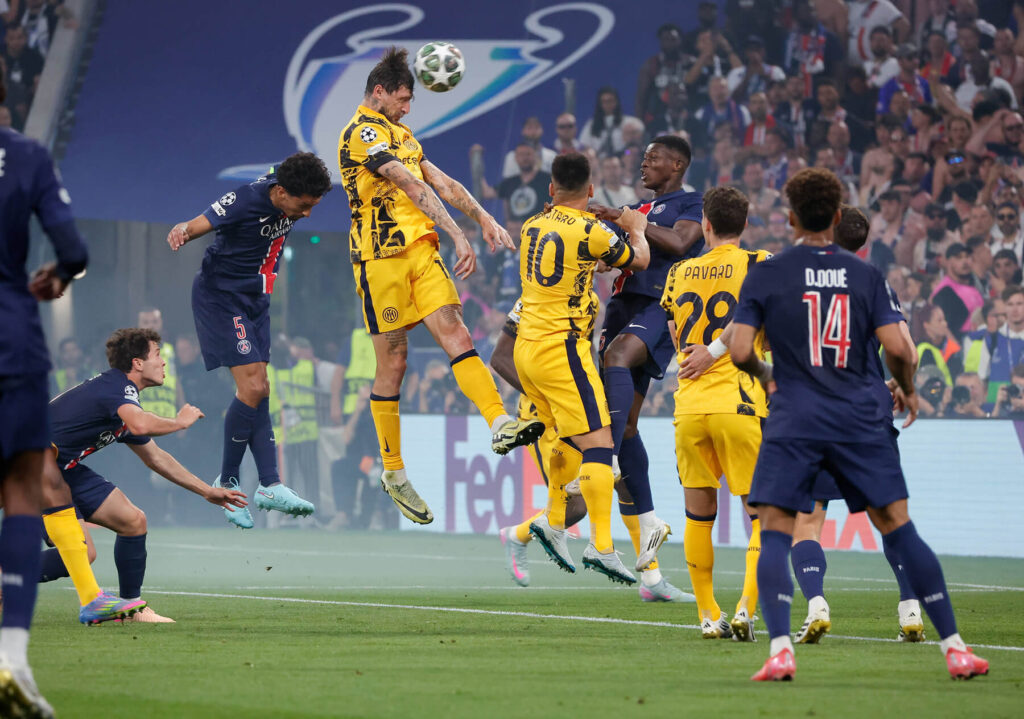
When your game plan relies on high-intensity wingbacks, and they’re just returning from injury, it’s hard. And PSG completely overpowered them. For the first 20 minutes, Inter were three against five in midfield – all the time. Every time Hakimi pushed up and either Dembele or Doué dropped back, it was a 5v3. Inter didn’t have a solution.
Sofascore: Not to single out anyone, but as a goalkeeper yourself, what’s your take on Yann Sommer’s performance in the final?
Schmeichel: I don’t think you can blame Sommer. To be a good goalkeeper, you need a good defense. Inter had some vulnerabilities – we already saw that in the semifinal against Barcelona.
Sommer was phenomenal in that semi. But in the final, they conceded five – and it wasn’t down to him. The defending just collapsed. At some point, it looked like they gave up. If anything, he was one of the reasons they even reached the final.
Manchester United’s Europa League disappointment and lessons to learn
Sofascore: Alright, now let’s talk about the Europa League final – we know it was tough to watch for you.
Schmeichel: You can see my body language change already. Yeah, it was bad. We finished 15th in the Premier League and lost 18 games. That’s nearly half the season. It’s not just this year – this is years of bad decisions since Sir Alex Ferguson left. It all exploded this season.
So, the Europa League final was a chance. A gift. Win that, and we’re in the Champions League. It could’ve changed the entire summer.
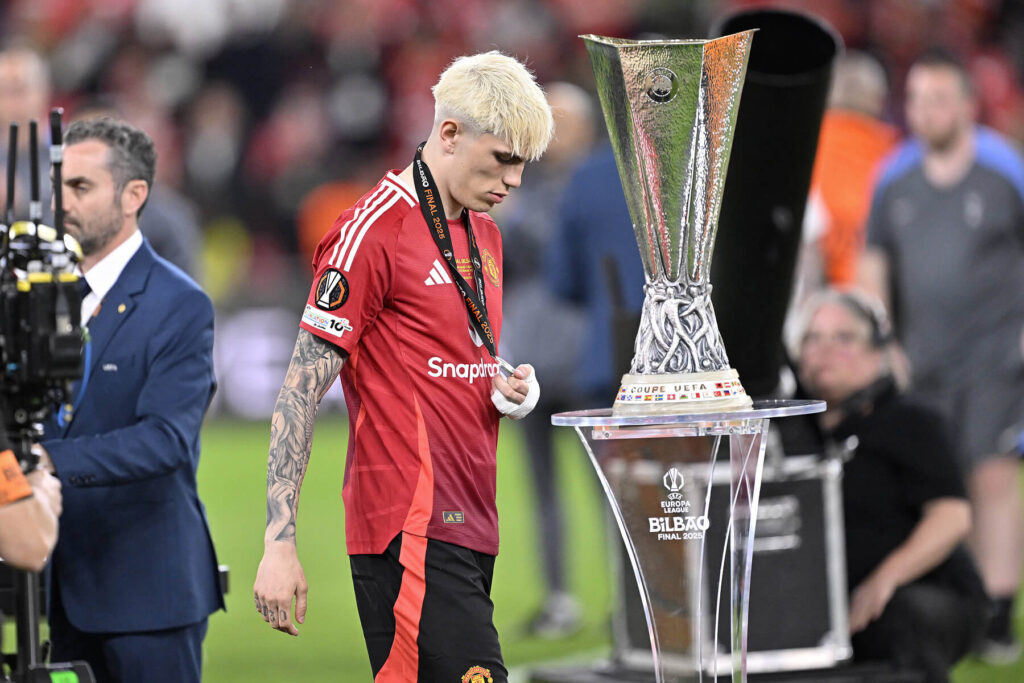
But to win a final, you have to turn up. You have to try. And that’s what disappointed me – it felt like we were just going through the motions. Against Lyon in the earlier round, we were down 4-2, and then scored three goals in eight minutes. That’s the Manchester United I know. Total risk. Total fight. That’s our DNA.
So I thought, “Okay, now they’ve tasted that, they’ll know how to switch into that mode again.” But then… nothing. One goal down, and we just passed it around. Come on! Nobody stepped up.
Tottenham didn’t do much to win either – they just defended deep. And if that’s the case, you need to throw something at them. Put Harry Maguire up top. Add bodies. You never know where the ball might fall. But we didn’t even try. That’s the part that hurts. You can lose a final – but only if you leave everything on the pitch. And we didn’t.
Sofascore: On the other side, Tottenham and manager Ange Postecoglou also had a challenging season – but ended with a trophy. What are your thoughts on him?
Schmeichel: It’s a great story. We talk so much about managers today – their philosophies, their styles of play. Ange has his own style, and we call it “Ange-ball” now. But let’s be real – up until now, he hadn’t won anything big by playing that way.
But something changed in Frankfurt. For the first time, we saw Tottenham just sit back and defend. They didn’t have the ball. When you look at the stats – and I know you at Sofascore are all about the stats – for more than half their games this season, Spurs had over 60% possession. In 10 games, they had more than 70%, and in a couple, over 80%.
But against Frankfurt, they were down at 34%. That’s not Ange-ball. That’s him trying to win a trophy – and he succeeded. For me, that’s good management. You adapt. You play to win.
But what I’d really like is for him to admit that. Just say, “Yeah, I changed it because it was more effective.” Don’t keep insisting on principles above everything. Because at the end of the day, we play football for the fans.
Yes, every fan wants to win in style – but if that’s not possible, they still want to win. No fan wants to lose beautifully every week. Look at Southampton. They got relegated trying to play out from the back with players who weren’t capable of doing it. Every game, they conceded a goal from that. Why? Because the manager’s principles mattered more than the result. I just don’t get that.

Rating himself – 12 goalkeeping skills under the microscope
Sofascore: Alright, time for something lighter. It’s time for our signature segment: Rate Yourself. We’ve prepared 12 typical Sofascore-style goalkeeping attributes. You’ll rate yourself from 3 to 10. Ready?
Schmeichel: Oh Christ… alright. Let’s do it.
Sofascore: First up – Footwork and ball distribution.
Schmeichel: That’s a bit tricky. We didn’t really play like that back in my day. Especially at Man United – we played out from the back, but we weren’t under pressure. I also threw the ball a lot, which was unusual. Today, this is the number one thing for goalkeepers, but back then, it wasn’t.
Let’s say… 8.4.
Sofascore: Next – Reflexes and explosiveness.
Schmeichel: That was definitely one of my strengths. 8.5.
Sofascore: Positioning.
Schmeichel: 8.5.
Sofascore: Shot stopping.
Schmeichel: That’s just… the job, right? 8.5 again.
Sofascore: One-on-ones.
Schmeichel: That was my best skill. 9.5.
Sofascore: Penalties.
Schmeichel: Funny one. We didn’t give away many. I saved a few, conceded a few… 6.5?
Sofascore: A bit low, don’t you think?
Schmeichel: Well, penalties are a lottery.
Sofascore: Crosses and aerial balls.
Schmeichel: That was my bread and butter. 9.4.
Sofascore: Game anticipation.
Schmeichel: 8.5. I played in teams where, to be honest, we weren’t under pressure that much. We had the ball a lot.
Sofascore: And your defensive line?
Schmeichel: Yeah, exactly. The way we played, we always tried to outnumber the opposition. Our defenders would push forward, and we’d have a numerical advantage almost everywhere on the pitch.
So my job, really, was to handle anything that went over the top. That was my role – to be alert for those moments. And yeah, that kind of concentration is important.
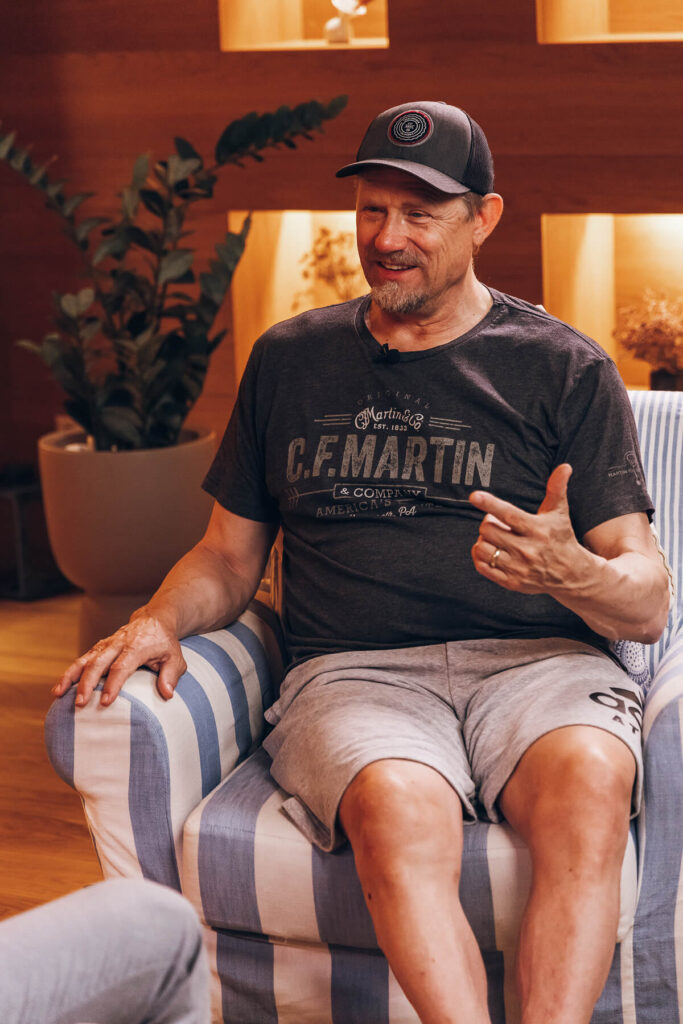
Sofascore: Agility and coordination.
Schmeichel: I was fine. 8.5.
Sofascore: Communication with the defense.
Schmeichel: I mean, I did talk non-stop, that’s for sure. And that’s actually really important. I did it for a couple of different reasons.
First, it was for myself – to stay focused and engaged in the game. Like I said earlier, I wasn’t directly involved for most of the match because we usually had the ball. So talking kept me mentally sharp.
The second reason was to make sure my defenders always knew where I was. If they constantly have to look back and check where the goalkeeper is, that takes up – what? One, two, three percent of their focus. But if they can hear me, they don’t have to look. They can stay fully locked in.
When I first came to Manchester United, it was Steve Bruce and Gary Pallister playing in front of me. They were really annoyed at how vocal I was. We had a lot of arguments – and yes, there’s plenty of footage of us yelling at each other. “Shut up already!” – that kind of thing. I won’t repeat the exact words, let’s just say they weren’t suitable for broadcast. But very quickly, they realized how helpful it was.
For example, like I mentioned earlier – when a player runs straight at you, that’s the worst position for a goalkeeper because there’s nothing to read. No body angle, no clues. But if my defenders could just push that attacker a few meters to one side, suddenly you can read a lot more – their footwork, their body shape. That’s the difference between reacting and guessing.
So I always wanted my defenders to “show them wide.” In the beginning, they weren’t used to that. They were trained to defend a certain way – to stay central and tight. And Steve Bruce, for example, wasn’t the quickest. But he was brave, clever, and a fantastic defender. He didn’t like being turned, but once he saw that I could handle those one-on-one, close down angles, and cover those situations, he trusted it. He got comfortable with it.
But that only works if there’s communication. Constant communication. I could see everything – but they couldn’t see me. So I talked all the time. In terms of communication with your defense – is that a good thing, or a bad thing?
Sofascore: Oh, it’s a perfect thing.
Schmeichel: Then what would I rate myself?
Sofascore: I think we’ve arrived at a clear 10. This is the moment. That one gets a 10.
Schmeichel: OK, that’s a 10.
Sofascore: Confidence and mental resilience.
Schmeichel: Well, again… come on. You play for Manchester United – if you don’t have mental resilience and confidence, you’re finished. And this goes for every single player who’s been at the club.
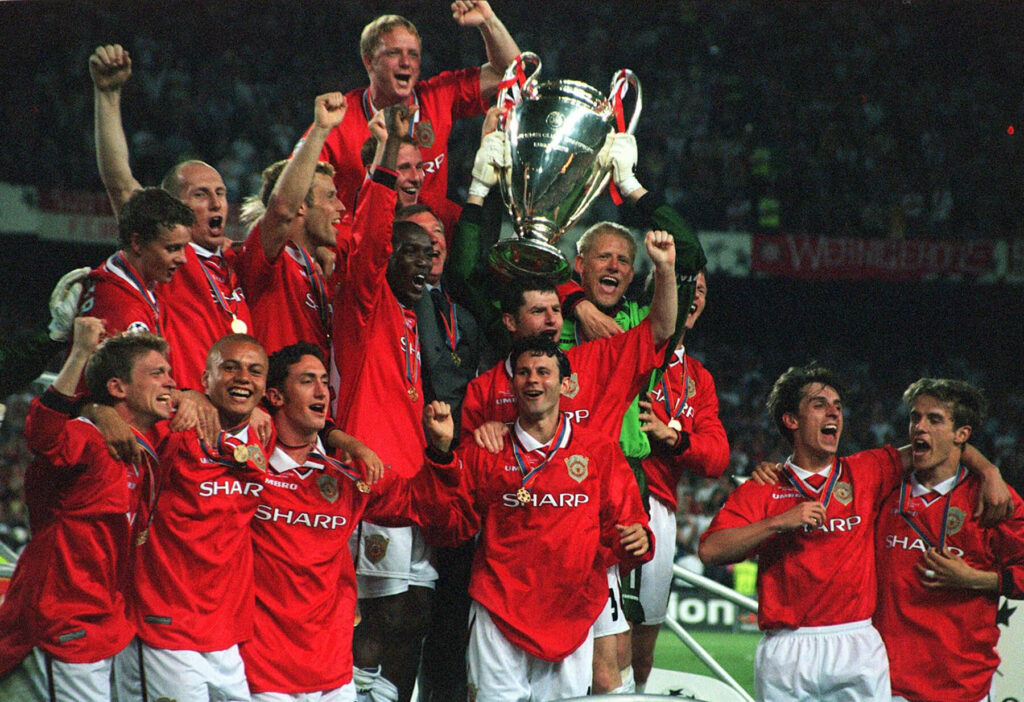
If I had to rate any of the players I played with at United in this category, it’s a 10. No question. Because if you don’t have that, you’ll never achieve what we did.
But here’s the thing – this is what people often don’t understand. We’re now seeing just how difficult it really is to play for Manchester United.
Every single thing you do – every little mistake – is noticed. Every time something doesn’t go well, it’s everywhere. Everyone who knows football – or even just follows it casually – will know what’s going on with Manchester United.
Maybe you could say the same about Real Madrid. Possibly Liverpool. Barcelona, maybe Bayern, but even that’s a stretch. With Manchester United, it’s a whole different level.
When things go wrong and you’re criticized, it’s nonstop. And it goes on for days. Just look at the Europa League final – we’re still talking about it.
If United had won that final, no one would’ve talked about Tottenham losing. No one. But that’s the pressure that comes with playing for United.
This is what most people don’t see – how mentally strong you have to be to play for that club.
Liverpool, I’ll include. They’ve been through a strange phase, so the pressure’s been different. But with Manchester United… it’s always on. Everywhere you go – whether it’s with the club or privately – the attention is just incredible.
So yeah. Confidence and mental resilience?
If you don’t have a 10, you’re not playing for Manchester United.
10.
Sofascore: And finally – Leadership.
Schmeichel: That’s tough to score. I played in teams full of leaders — at Brøndby, at United, with Denmark. But leadership isn’t always easy. Sometimes you say things too directly, because there’s no time for niceties. And that’s not always constructive. So I’ll say 8.8.
Sofascore: Who’s the biggest leader you played with?
Schmeichel: Brian Robson. Best captain ever. Always led by example. Drew people in, on the pitch and in the dressing room. And he never made it about himself.
Sofascore: Not Roy Keane?
Schmeichel: Roy was a great leader on the pitch – no doubt. But off the pitch, back then, he wasn’t so great with people. A bit shy, maybe. Not introverted, definitely not – but different. Brian was the full package.
Sofascore: So… drumroll… your final average rating is?
Schmeichel: 8.76! That’s alright. But to be honest, it’s hard to rate yourself. If I wasn’t good at everything on that list, I wouldn’t have played for United. We probably wouldn’t be talking right now!
Sofascore: One last thing – check out the leaderboard. You’re number one.
Schmeichel: Oh my God, I’ve put myself number one. But it’s difficult, you’re trying not to be an idiot. And there are only five names on here. Let’s wait till there are 25! Still… it’s all a bit of fun.
Sofascore: That’s it for this part. Let’s move on to the next!
Part 2, coming soon…
